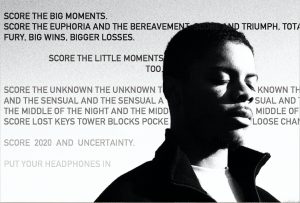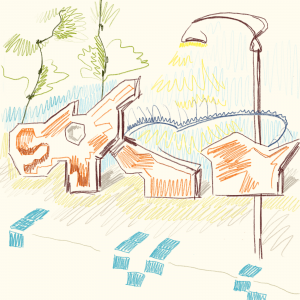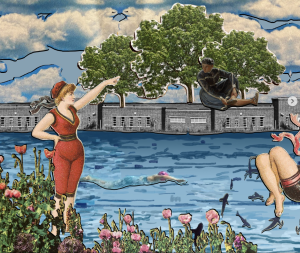What we talk about when we talk about weather
by Violet Aitchison | April 29, 2024

July 2023, sunny Portugal. The day before I was bed-bound with heatstroke. When weather became more than small talk.
Family lore states that my ‘lively’ disposition can be explained by the fact that I was born during a thunderstorm. Although it hasn’t rained on my birthday since then—nearly twenty-one years ago—weather holds such significant symbolism in our society that I suppose it’s unsurprising the memory of the thunderstorm has lasted. Even today, any student who has taken a GCSE in English knows if you whack in a comment about pathetic fallacy, you’re bound to score at least a few extra marks. Yet, despite its ongoing significance, in a peculiar dynamic, weather is often disregarded as ‘unimportant small talk’. Bring up the weather during an awkward silence and suddenly you’re that person. Clearly you don’t have anything more interesting to say. But, when it has held so much significance in all aspects of life, why are we so quick to brush it off?
Small talk was first studied in 1923 by the Polish-British anthropologist Bronisław Malinowski, who is best known for revolutionising the study of human cultures and founding ‘social’ anthropology. In Malinowski’s essay ‘The Problem of Meaning in Primitive Languages’, small talk is referred to by its anthropological ‘proper’ name: phatic communion or ‘bonding by language’. In its simplest form, small talk is a bonding ritual which serves to define relationships at every level. It’s not surprising that during freshers’ week you’ll hear lots of questions like ‘what are you studying’ and ‘where are you from’. We are all staking out our positions, slyly trying to decide who might be a fit match for a friend. Perhaps I’m more socially inept than many of you, but without those conversation crutches, I’m not sure I would have been able to figure out who seemed to have those similarities which would allow some initial form of friendship—even if it wasn’t long lasting.
In the first instance you can’t know what makes your new friend laugh or what really grinds their gears, but I’m sure you can take a guess that they’ve complained about the rain ruining their hair or sweat patches creeping through grey T-shirts. And when it comes to weather, its specialty lies in the fact that there aren’t really any other physical sensations that humans, regardless of their identity, can all claim to have experienced. When it’s hot, we can all recognize the feeling of a bead of sweat dripping down the back of our neck. Or when it pours with rain, that familiar feeling of clothes sticking to our bodies, our skin wet and cold. So, inevitably, you offer a friendly, inoffensive: ‘strange weather we’ve been having!’ And you can sigh a sigh of relief knowing you are in the haven of weather: both parties well equipped with anecdotes.
The disregard of so-called small talk has always fascinated me. Its dismissal must come from a place of superiority. It’s a person saying that they believe they are above the conversation; that they think they are more interesting, and more capable of ‘deep’ chat than what is being offered up. And to an extent, of course this is true. It’s not like I’m championing sitting around for hours talking about how it’s another overcast day. But small talk can be such a gift. It is indeed one of the only forms of communication that rejects self–indulgence, as in order for the conversation to start flowing, you must listen to the other person attentively. And, if done right, you can find out lots about a person. A simple ‘how was your day’ might appear mindless, but if the response reveals how your habits differ, or ways in which your routines align you’ve been bestowed ample opportunities to ‘dive deeper’ if you so wish.
For me, this came all to a head a couple of years ago just before my great grandmother died. She was a distant figure to me. Stern, traditional, and stubborn—all I knew of her was that she enjoyed glasses of wine and feeling superior to people. So, when I was asked to look after her for a day, my selfish seventeen-year-old brain thought ‘what a bore’. I was nervous to speak to her. She had always felt like such an old person to me, and I didn’t know how I’d spend the day entertaining conversation. It was the middle of June, just ten or so days before my birthday, and it was a beautifully sunny day. In desperation to break the discomfort of the first few minutes together I commented on the weather and how it was always sunny on my birthday. ‘Yes,’ she said, ‘it’s normally always sunny. Apart from my wedding day.’
I had never known that I was born on her wedding day and after that we had a conversation about her marriage, her life. I felt a strange tug to this woman, my great grandmother, who other than small amounts of genetics, I thought I shared little with. But, as it turned out, after all this time, the rain on the 21st of June in 1934 and 2003, had held significance for both our lives. She died just over a month later, but I always look back fondly on that day. For that ‘small talk’. Because without the weather, she would have remained a forbidding figure whom I thought I’d never really known.∎
Words by Violet Aitchison. Image courtesy of Violet Aitchison.




